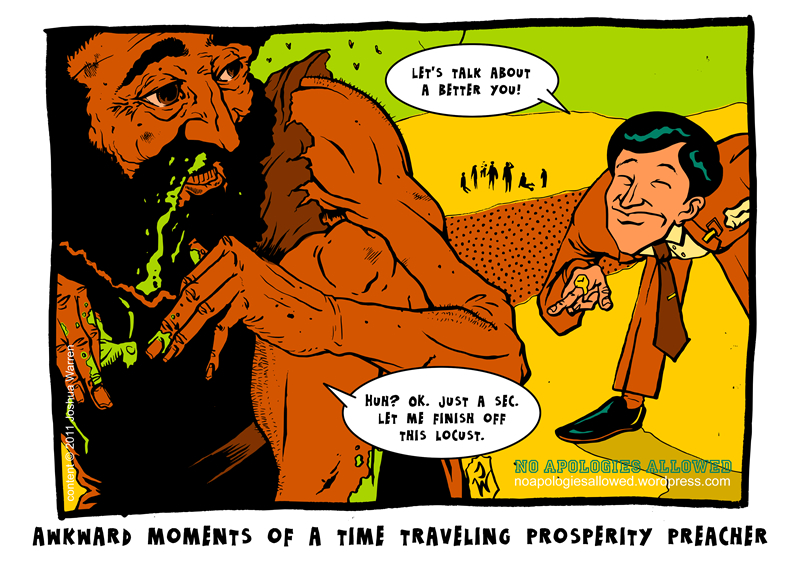How To Get God To Give You The Stuff You Really Want—or "Is the Kingdom of God Cool or What"!
I’ve found that the quickest way to destroy your own Christian faith is to listen to Christians. Christianity has been a force for overwhelming good, at least as it has been expressed by some of its followers, Alexander Solzhenitsyn, Fyodor Dostoevsky, René Descartes, Galileo, Martin Luther King and Mahatma Gandhi. Technically, Gandhi wasn’t a Christian, because he didn’t say the magic words and didn’t go to church. In spite of this, he claimed to have great admiration for Jesus, although he didn’t seem to care much for his followers. He did, however, take Jesus’ teaching about non-violence and move a mountain—the mountain being the British Empire and the effect being freedom for millions of people suffering under colonial rule. But, hey, what’s more important, actually doing what Jesus said or talking about it? After all, theology trumps action, otherwise you’d be talking about works and not grace. And don’t get me started on grace, my friend. If you don’t accept grace, God’s free offer of Salvation, you can end up in Hell, and that is not good, let me tell you!
I know James, Jesus’ brother, said something about faith without works being meaningless, just as works without faith is meaningless. But Martin Luther didn’t like that particular part of the Bible anyway and wanted to chuck it out. It may be that what Brother James and his oft-quoted sibling were actually saying was that, if you do a kindness for personal gain, then you’re doing it for the wrong reason. The idea being that you should learn to be merciful because God is merciful. But hey, that sounds way too simple. He must have meant something more epic than that, something about eternal damnation vs. a big mansion in the sky. Oh well, we’ll leave that to the people who’ve been to Bible College and our favorite TV preachers.
I know James, Jesus’ brother, said something about faith without works being meaningless, just as works without faith is meaningless. But Martin Luther didn’t like that particular part of the Bible anyway and wanted to chuck it out. It may be that what Brother James and his oft-quoted sibling were actually saying was that, if you do a kindness for personal gain, then you’re doing it for the wrong reason. The idea being that you should learn to be merciful because God is merciful. But hey, that sounds way too simple. He must have meant something more epic than that, something about eternal damnation vs. a big mansion in the sky. Oh well, we’ll leave that to the people who’ve been to Bible College and our favorite TV preachers.

Then you say to yourself, “Maybe I should think about this a little bit harder, not too hard, because I’ll feel unhappy, but just enough to get some God points for my Heavenly crown.”
Let’s say you’re driving down the street and you see a disgusting homeless person, he’s stinky and has bad habits, ungodly habits, like smoking and probably even drinking alcohol—not like you do at the end of a hard day at work, or when you’re watching football with your buds—this guy probably drinks during the day, while he’s mooching some dough off of hard-working Americans. Then you remember, “My pastor, the one who lives in a really big house, told me that if I give to those in need (after I've tithed my ten percent, of course, and preferably fifteen percent if I really want to be blessed), I can get a hundredfold return on my investment. That’s way better than the stock market, even better than some Ponzi scheme, where some big shot takes your money and then buys a big house and gives you a lot of promises about a big payoff someday. Who’d be stupid enough to buy into that? Not me, that’s for sure!” So you say to yourself, “If I give this pathetic bum a buck, I can get a hundred dollars back and buy that new fishing pole that I’ve been eyeing online.” So you reach into your pocket and give it to him with a pamphlet that says "God loves you and so do I". And then you head home to an ice-cold six pack, some reality TV, and order that new fishing pole. Damn, the way God’s economy works is really cool, but first you apologize for saying damn—or maybe you only thought it so it’s not so bad—anyway, you apologize and thank God for His grace and mercy, for your nice house and car, your kids, who weren't born with two heads, and for just being an American. God is good. Amen!
Even as I write these things I can hear the chorus of voices saying, “You need to love your fellow Christians, even if you disagree with them!” They're right, of course. I don’t know most of them, however, and saying that I love them is more a formality than a reality. What I don’t love is what they teach, a message of an angry God who can only be appeased by blood and suffering. After all, somebody has to pay the bill; God in His infinite wisdom needs to balance the ledger, like some kind of anal-retentive accountant compulsively trying to get the numbers to add up. How much bloodshed is necessary to pay the debt of sin accumulated by a sinful humanity—maybe all human and animal life, as in Noah’s time, minus the fish and a couple of doves, of course. Perhaps incinerating a couple of urban cities like Sodom and Gomorrah or New York and San Francisco, inciting a blazing holocaust of sexual miscreants and other sinners—like Liberals, abortionists and people with different theological perspectives. This notion of love is peculiar to say the least—and would probably make more sense if it was the philosophy of your average serial killer or murderous dictator. But it isn't It’s the view of many Christians the world over, especially in the good ole USA.
Mark Magula
Let’s say you’re driving down the street and you see a disgusting homeless person, he’s stinky and has bad habits, ungodly habits, like smoking and probably even drinking alcohol—not like you do at the end of a hard day at work, or when you’re watching football with your buds—this guy probably drinks during the day, while he’s mooching some dough off of hard-working Americans. Then you remember, “My pastor, the one who lives in a really big house, told me that if I give to those in need (after I've tithed my ten percent, of course, and preferably fifteen percent if I really want to be blessed), I can get a hundredfold return on my investment. That’s way better than the stock market, even better than some Ponzi scheme, where some big shot takes your money and then buys a big house and gives you a lot of promises about a big payoff someday. Who’d be stupid enough to buy into that? Not me, that’s for sure!” So you say to yourself, “If I give this pathetic bum a buck, I can get a hundred dollars back and buy that new fishing pole that I’ve been eyeing online.” So you reach into your pocket and give it to him with a pamphlet that says "God loves you and so do I". And then you head home to an ice-cold six pack, some reality TV, and order that new fishing pole. Damn, the way God’s economy works is really cool, but first you apologize for saying damn—or maybe you only thought it so it’s not so bad—anyway, you apologize and thank God for His grace and mercy, for your nice house and car, your kids, who weren't born with two heads, and for just being an American. God is good. Amen!
Even as I write these things I can hear the chorus of voices saying, “You need to love your fellow Christians, even if you disagree with them!” They're right, of course. I don’t know most of them, however, and saying that I love them is more a formality than a reality. What I don’t love is what they teach, a message of an angry God who can only be appeased by blood and suffering. After all, somebody has to pay the bill; God in His infinite wisdom needs to balance the ledger, like some kind of anal-retentive accountant compulsively trying to get the numbers to add up. How much bloodshed is necessary to pay the debt of sin accumulated by a sinful humanity—maybe all human and animal life, as in Noah’s time, minus the fish and a couple of doves, of course. Perhaps incinerating a couple of urban cities like Sodom and Gomorrah or New York and San Francisco, inciting a blazing holocaust of sexual miscreants and other sinners—like Liberals, abortionists and people with different theological perspectives. This notion of love is peculiar to say the least—and would probably make more sense if it was the philosophy of your average serial killer or murderous dictator. But it isn't It’s the view of many Christians the world over, especially in the good ole USA.
Mark Magula
|
|
|
